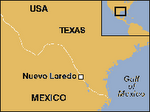By Frank Levine
Former U.S. President Richard M. Nixon reportedly advised a much younger and supposedly naïve Donald Rumsfeld, now U.S. defense secretary, that “Latin America doesn’t matter…people don’t give one damn about Latin America…it’s just a waste of time.”
More than 30 years since his somewhat cynical observation, little has changed. Rumsfeld is Rumsfeld, and Latin America is as alien and confusing a political and economic landscape as ever to the United States.
The prevailing view among Latin American intellectuals then was that the great sea of poverty extending from the U.S. border to Tierra de Fuego, resulted from centuries of exploitation and injustice by powerful foreign interests, supported by complacent local oligarchies, with often miserable consequences for the masses.
It was nearly 500 years of dominant foreign technology and brutality, combined with a mixture of localized racism and ignorance, that laid the foundation and fate of modern Latin America — now sealed with the blood and bones mortar of millions.
This perception, however, changed in the early 1980s, when the Reagan Administration’s “Great Capitalist Leap Forward,” along with its hordes of evangelical Christian crusaders, viewed the demands for social and economic change in Latin America as a form of mass hysteria— mind control emanating from the great “evil God-less empires of Communist Russia and China.”
Cuba, of course, was the diabolical agent provocateur and the demand for human rights was just a communist conspiracy to stir up trouble.
Anyway, they reasoned, why would people want change? Not only was capitalism good for all the Americas, but poverty and misery was just a station in life on the way to a better life—usually, on the other side of death. If you were poor and miserable, they reasoned, it was probably you own fault, if not God’s will.
It is a convincing argument if you are uneducated, unemployed, and live in a cardboard box or under a pile of garbage.
The first question in response, of course, is: “When do we eat.”
Latin Americans often tried to respond, but no one seemed to listen to their pleas for social and economic justice. Latin America wanted its own ideology. If nothing new, certainly an ideology reflective of the region’s 20th and 21st Century reality, rather than an one imported from, at the very latest, 19th Century Europe. Many reasoned that it should be a socialist-democratic ideology, modeled, in part, on the post-World War II Western European experiments, and not on the , Cuban, Russian or Chinese models.
After nearly five centuries of church-supported colonial and neo-colonial rule, there had to be something better in the offing.
But over the next 25 years, the revolutionary social and political ideologies that threatened business as usual where either routed on the field of battle, compromised through infiltration, or showered with the political and economic currencies of betrayal. Revolutionaries and opposition leaders were bought, sold and traded like baseball cards by local security forces, financed and trained by the U.S. intelligence apparatus. Most were eventually killed or imprisoned if they failed to “see the light.”
Religious groups, meanwhile, infiltrated indigenous populations recruiting millions of believers with a promise of a better life…if they “rendered unto Caesar.” They claimed that any attempt to change their fate played into the hands of the diabolical communists, or subversivos.
People were murdered for asking for medical care in their villages, schools for their children, or simply drinking water. They were murdered for asking for a livable wage or adequate housing. Any demand for a change was considered a threat, even if the change would address the simplest of human needs.
God forbid you should organize.
The Catholic Church, meanwhile, positioned itself, as always, both in front and behind the rifles. By the early 80s, it finally decided that “Liberation Theology” conflicted with its own relationships and institutions. The poor give only chickens and pigs. The rich gave money and power. In a sense, the Catholic Church once again assumed its traditional role as a force used to smother and misdirect dissent against the region’s elites and their political and social injustices.
Soon, bearded revolutionaries, who once roamed the hills with the Mao’s “Little Red Book,” or “Guerrilla Warfare,” by Che Guevara, were now “born again” politicians, business leaders, or even worse, well-paid writers and journalists.
Revolutionaries who watched many of their comrades disappear, brutalized and tortured by the thousands and hurled into unmarked mass graves in the 1970s and 80s, now sloughed off their youthful ideological indiscretions, with shrugs and uneasy smiles before the cameras.
The 1980s brought on the age of the U.S.-trained government technocrat, through which the administration and distribution of social and economic justice became linked with individual and free market responsibilities. As a result, the role of government as arbitrator between classes, and as a social and economic guiding force, was neutralized by a grand vision marketed by foreign interests to the region’s educated elite, that only through free market ideas and economies can Latin America hope to develop and compete in a complex world marketplace.
Inspired by their shopping sprees to Miami and San Antonio, the elites were now convinced that Latin America would embark on its own “Great Leap Forward,” propelled by globalization, and privatization, and if needed, democracy…as long as the democracy didn’t wander too far from the Hacienda and the right people were paid.
There is always room for another McDonalds to serve their children.
Few foresaw privatization of key infrastructures and services implied-- that along with some improved efficiencies, the burden of corporate profits and greed would fall most heavily on the poor.
In some countries, the privatization of water meant that instead of costing the poor one day’s labor for a month’s supply, it now cost more than a week’s labor. Electricity and telephone services, once dominated and strictly controlled by governments, entered into a free market frenzy under privatization, opening the door to predatory pricing and abuses.
This is nothing new, Latin America has always given much more than it received…its damnation remains its tremendous exploitive potential for wealth —in both resources and humanity.
By the end of the 1990s, it was obvious the great leap had, in most instances, failed. Although the deepening of poverty and despair in Latin America is due in large part to foreign and domestic exploitation, it was the region’s own political and economic inefficiencies, exacerbated, in part, by a changing world marketplace and a shifting geopolitical climate, that pushed the region closer to a social and economic abyss and instability..
Always present were the predators and their undeniably non-democratic international financial and regulatory institutions.
The past 30 years demonstrates that many regional economies, even with their new freedom from government monopolies over vital resources and services, still could not keep pace with exploding domestic demands and populations. Free Trade agreements proved beneficial, not to the emerging economies, but to the developed economies, where capital, production, and intellectual resources dominate the playing field.
There were exceptions, of course, for a time in Brazil and now Argentina, but overall, only the big players-- the ruling classes and their dominant business interests, benefited from such agreements.
Overall, contrary to the glowing governmental statistics, indeed Latin American nations have made more money over the past ten years than ever--the rich got richer and the poor, poorer. Sure, there are more wealthy and middle class Latin Americans, but it is only because the population has soared. The percentages of rich, poor and middle class remain roughly the same…the only difference is that instead of 200 million poor a few decades ago, there are now well over 400 million, most without meaningful work, education, or minimal access to resources.
Admittedly, there has been some progress. Military governments and dictatorships have been all but banished from the landscape. Democracy, that great American ideal, has finally reached the masses, much to the dismay of Washington, Wall St., The International Monetary Fund, The World Bank and, last but not least, The World Trade Organization.
These institutions are used to getting their way with pliable politicians and central bankers, and if democracy continues to flourish through the region—especially if the masses participate and elect so-called “populist” governments, the golden age of parasitic exploitation could end in a new non-aligned regional order, un-beholding to powerful internal and external influences.
Now, at last, while the United States is preoccupied with other parts of the world, Latin Americans are beginning to find their voices through the ballot box-- but few among the region’s rich and powerful are listening. Their failure to listen is at once tragic and opportune, as for the first time since the Conquest, Latin American can once and for all throw off the yoke of neo-colonialism and imperialism. Latin America can be truly free and non-aligned. It can finally chart its own course as a reflection of its unique cultures and views.
Of course, the consequences of such a dramatic change could be catastrophic in the near term, as reactionary elements will use any means necessary –up to and including subversion, assassination, and military intervention-- to derail regional populist democracies and the will of the masses.
Yes, the ideals of the Mexican Revolution, Sandino and Bolivar, are not dead, even if high-flying birds find their weather-beaten monuments to be good targets of opportunity.
For the United States, meanwhile, the voices from the region represent a new opportunity to correct the mistakes of the past and to develop foreign policy objectives to include the region’s collective will—even if it is against the interests of its powerful transnational corporate sponsors and their gunboat diplomacy.
Monday, February 27, 2006
U.S. keeps a blind eye on Latin America
Posted by
Frank Levine
at
02:17
0
comments
![]()
Labels: Che, Cuba, foreign policy, Frank Levine, Latin America, Rumsfeld
Subscribe to:
Comments (Atom)





